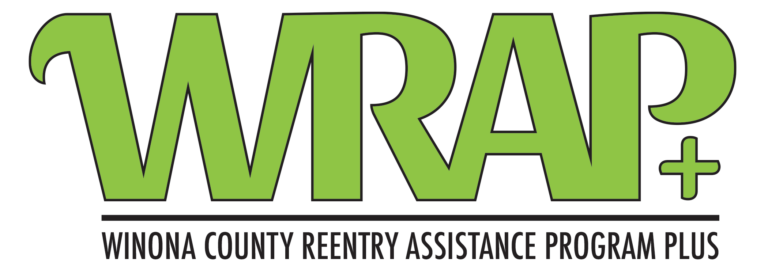About WRAP+
Below are Frequently Asked Questions about WRAP+ along with answers to those questions. The WRAP+ Policy and Procedure Manual, which is posted on the WRAP+ Forms webpage, contains many of the answers to the most common questions about WRAP+. If you have additional questions about the program that are not answered below or in the WRAP+ Policy and Procedure Manual, please call Kalene Engel, Grant Manager at (507) 453-3646 or e-mail her at [email protected].
FAQ
Most frequent questions and answers
WRAP+ is short for Winona County Reentry Assistance Program Plus. The program contains three main components (1) an extensive cross-training program for criminal justice and behavioral health personnel; (2) a social worker embedded in the jail to address in-jail behavior health concerns of inmates and to conduct or coordinate additional assessments or referrals and (3) an expanded re-entry program to assist persons who have been involved with the criminal justice system to help them avoid further involvement in the system.
Reentry refers to the return of offenders from incarceration back into the community. A reentry program is a program that helps an offender address the gaps or issues that may prevent an offender as they transition into the community. Some of the common things that a reentry program can assist people with include housing, health insurance, chemical dependency and mental health assessment and treatment, transportation and getting ID cards and birth certificates.
WRAP+ is an enhanced reentry program, offering more than previous Winona County reentry programs. Following are the enhancements of WRAP+:
- WRAP+ has expanded eligibility criteria and does not require an individual to have been incarcerated in order to access services.
- Risk, mental health and chemical dependency screens are performed at jail admission or upon referral to the program.
- Qualified individuals are paired with an Adult Rehabilitative Mental Health Services Worker (also called a Mental Health Practitioner) to work with the participant to identify areas of needed services and to assist the individual in accessing services.
- Funding is available through the grant to assist with recovery support services, such as rent, transportation, medical and prescription expenses (until health insurance is in place), and related expenses.
Adult residents of Winona County who have high risks and needs and are involved in the criminal justice system, who have mental illness or co-occurring mental illness and substance abuse disorders, who agree to participate and who are not excluded due to risk of violence or criminal history are eligible for WRAP+. Each one of these criteria is further explained in the WRAP+ Policy and Procedure Manual located on the WRAP+ Forms Page.
All individuals who are booked into the Winona County Jail are given an opportunity to apply for WRAP+. Referrals are also welcome from other sources, including self-referrals. To apply for WRAP+ an individual must complete a Combined Screening & Application Form. This form is available in multiple formats, including online, .pdf fillable and paper form, all of which are available on the WRAP+ Forms page. Completed applications should be delivered to Trish Chandler, Jail Intake Worker in the Winona County Jail or e-mailed to her at [email protected].
- Referral & Screening
- Application & Eligibility (Target Population) Verification
- Assessment
- Case Management
- Program Completion
- Alumni Participation
See the WRAP+ Forms Page for a Program Flowchart which illustrates the different stages of WRAP+.
No, this is expressly forbidden by the WRAP+ Policy and Procedure Manual. The intent of the program is to assist people in getting the help they need to avoid further involvement with the criminal justice system, not to add more charges.
Completed applications are reviewed by the Jail Intake Worker to determine whether the applicant is eligible to participate in the program. This is called “target population verification.” All applicants will be notified of eligibility determination. Applicants who do not qualify may re-apply or request an appeal of the eligibility decision to the WRAP+ Task Force.
The next stage of WRAP+ is the assessment stage, when an accepted applicant works with a case manager to arrange for and obtain mental health and/or chemical dependency assessments. Applicants will be required to sign a WRAP+ Release of Information at this stage and will also be eligible for certain categories of funding, including funding for the assessments and funding for monitoring services which would allow them to be released from jail.
Case management through WRAP+ will be provided by a treatment court coordinator (for participants who are in treatment court) or a Mental Health Practitioner (for participants who are not in treatment court). The Jail Social Worker will provide transitional case management services to individuals who apply for the program while incarcerated until a referral can be made to Treatment Court or a Mental Health Practitioner. The referral to your initial case manager will be made by the Jail Intake Worker at the time you are accepted to WRAP+.
During the case management stage, the agencies and individuals involved in the participant’s case plan and in the recovery processes work together with the participant (and the people in his or her support system) to develop collaborative and comprehensive case plans or care coordination plans (collectively “case plans”). The case manager works directly with the participant to assist, adjust and monitor the case plan.
WRAP+ provides different levels of funding for individuals as they progress through the WRAP+ Program, as described below. A downloadable excerpt of the Funding section of the Policy & Procedure Manual can be accessed by clicking here..
- Tier 1 Funding is available to accepted applicants (those persons who have applied for and been accepted into the program and signed a WRAP+ Release of Information). Tier 1 Funding pays for the cost of mental health and chemical dependency assessments if there is no other readily available source of funding. Tier 1 Funding also pays for the cost for a limited period of monitoring services for incarcerated individuals, if ordered as a condition of release from incarceration. Monitoring services include GPS, electronic alcohol monitoring, electronic home monitoring and a drug patch. Tier 1 Funding will be terminated for Accepted Applicants who do not become a WRAP+ participant within 30 days of referral to treatment court or the HUB, unless the failure to become a WRAP+ Participant is not the fault of the Accepted Applicant
- Tier 2 Funding is available to WRAP+ participants (an accepted applicants who has is a treatment court participant or a HUB client). Tier 2 Funding includes the following:
- Housing: rental application fee, payment of rent, utility bills, up to $100 in essential housing items (toilet paper, bedding, cleaning supplies)
- Health: insurance premiums/co-pays, chemical dependency assessment, diagnostic/mental health assessment, domestic violence assessment, medical expenses, dental expenses, vision expenses, medications, GPS fee for appointments.
- Identification: identification cards, Social Security cards, birth certificate
- Clothing/shoes: basic clothing upon release, essential toiletries, work clothes, shoes
- Transportation: bus pass, cab fees
- Child care: emergency childcare assistance
- Work-related: up to one month of GPS, UA and daily fees for work release eligible participants; GPS fee for job search
- Education: application fee; GED fee; books, web access fees
- Communication: phone cards
- Monitoring expenses: up to three months of expenses for drug patch, GPS, electronic alcohol monitoring or electronic home monitoring
- Tier 3 Funding: Tier 3 Funding is identical to Tier 2 Funding, but it available only to WRAP+ Alumni (persons who have successfully completed WRAP+) for up to six months following the date of program completion.
Yes. As noted above, some expenses only apply to individuals who are certain stages of WRAP+. Additionally, there are other restrictions on funding as noted below and as included in the downloadable excerpt of the Funding section of the Policy & Procedure Manual, which can be accessed by on the WRAP+ Forms Page.
Unallowable Expenses: The following expenses cannot be funded with WRAP+ funds:
- Expenses that would fund items in violation of probation terms or a court order.
- Expenses that extend beyond a year: security deposit
- Non-essential household items: curtains, rugs, dishes, lamps, artwork, appliances and personal electronics.
- Non-essential personal items: makeup, non job-related clothing, cell phone.
- Direct payments: payments made directly to the person for whom funding is sought
- Other: food, expenses that can be readily paid by another source, illegal items, fines, gas cards, past due expenses, restitution
Connection to Case Plan: Tier 2 and 3 funding requests must be consistent with and in furtherance of the participant’s case plan or care coordination plan.
Exhaustion of Other Funding Sources: WRAP+ Funds are to be used as a last resort. All appropriate service agencies and/or organizations must be checked for expendable dollars, donations or waived fees prior to filling out this request. If a request is considered time-sensitive, such that waiting for an eligibility determination from another source will adversely impact the person for whom funding is sought, WRAP+ funds may be used to cover the costs of the request.
No funding requests will be accepted directly from WRAP+ participants. Tier 1 Funding requests for monitoring services must be made through the Jail Social Worker.
Tier 1 Funding requests for assessments must be made through the Jail Social Worker, Community Connector, Treatment Court Coordinator or Jail Intake Worker, as set forth in the Policy & Procedure Manual, Section V. Tier 2 & 3 All other Funding requests MUST be made through a case manager (treatment court coordinator or community connector).
A person requesting funding must complete a WRAP+ Funding Request Form. Any associated documentation, such as a lease agreement or bill must be provided with the Request form. A W-9 Form signed by the vendor (payee) should also be included. Funding requests can be sent to the grant manager at [email protected]. Typically, requests for funding are processed within 1-2 business days of receipt and the requestor will be notified of the funding decision. Case managers are responsible for obtaining a WRAP+ Receipt from any participants who has received funding.
Case managers of WRAP+ participants must complete quarterly data sheets regarding those participants and submit it to the grant manager by the 10th day following the end of each quarter (i.e. April 10th, July 10th, October 10th, January 10th). A Data Collection Guide, with instructions for the data sheet, is posted on the WRAP+ Forms Page.

